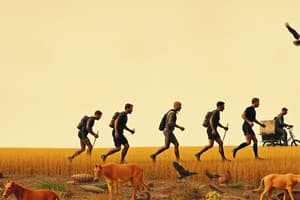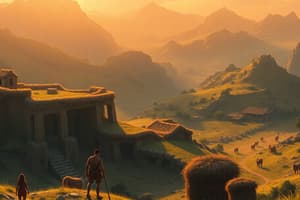Podcast
Questions and Answers
নির্মাণবাদের প্রথম অনুষ্ঠানের ভিত্তি কী ছিল?
নির্মাণবাদের প্রথম অনুষ্ঠানের ভিত্তি কী ছিল?
- নৃত্য
- চাষ (correct)
- খাদ্য
- শিল্প
মানব ইতিহাসের প্রাথমিক অংশ কত পর্যন্ত পৌঁছেছিল?
মানব ইতিহাসের প্রাথমিক অংশ কত পর্যন্ত পৌঁছেছিল?
- 2.6 মিলিয়ন বছর (correct)
- 476 CE
- 750 BCE
- 10,000 BCE
Homo habilis এবং Homo erectus কোন কালে উত্থান করে?
Homo habilis এবং Homo erectus কোন কালে উত্থান করে?
- ২.৮ মিলিয়ন বছর আগে (correct)
- c. 750 BCE
- c. 476 CE
- c. 10,000 BCE
Mesolithic Period-এ মানুষেরা কি করে?
Mesolithic Period-এ মানুষেরা কি করে?
Classical Antiquity পর্যায়ের সময়ে, আরো ___________?
Classical Antiquity পর্যায়ের সময়ে, আরো ___________?
Australopithecus, Homo habilis, Homo erectus, ________________?
Australopithecus, Homo habilis, Homo erectus, ________________?
প্রাচীন গ্রিস কোন উদাহরণের জন্য পরিচিত?
প্রাচীন গ্রিস কোন উদাহরণের জন্য পরিচিত?
রোম যখন প্রথম সুপাওয়ার হিসেবে উভয় পশ্চিমী দেশের উভয়ের ওপর প্রভাব ফেলে, তখন এটির প্রভাব ছিল:
রোম যখন প্রথম সুপাওয়ার হিসেবে উভয় পশ্চিমী দেশের উভয়ের ওপর প্রভাব ফেলে, তখন এটির প্রভাব ছিল:
নীচের কোন ঘটনা মেডিভ্যাল কালের পাঠ্যের মাধ্যমে ফর্ম নেয়?
নীচের কোন ঘটনা মেডিভ্যাল কালের পাঠ্যের মাধ্যমে ফর্ম নেয়?
1500–1800 CE-র Early Modern Period-e Europe-য়া-রা কি শিখানোর চেষ্টা করে?
1500–1800 CE-র Early Modern Period-e Europe-য়া-রা কি শিখানোর চেষ্টা করে?
Late Modern Period-e 1800- Present Day-র Industrial Revolution-er arrival-র ফলে, হাজারো technological breakthroughs and socioeconomic changes-er উৎথান হয়। The late modern period-er defining feature-রা:
Late Modern Period-e 1800- Present Day-র Industrial Revolution-er arrival-র ফলে, হাজারো technological breakthroughs and socioeconomic changes-er উৎথান হয়। The late modern period-er defining feature-রা:
Ancient Greece-r cultural legacy-র shaping force-রা:
Ancient Greece-r cultural legacy-র shaping force-রা:
Flashcards are hidden until you start studying
Study Notes
Unraveling Our Past: Exploring Human History
Human history spans millions of years, encompassing tales of survival, innovation, collaboration, conflict, and discovery. In this journey through time, we'll delve into our ancestors' footprints — tracing their steps from prehistoric beginnings to the present day.
Prehistoric Era (c. 2.6 million years ago – c. 4,000 BCE)
The oldest chapters of human history unfold during what is known as the Prehistoric Era. From humble origins with Australopithecus, early hominids like Homo habilis and Homo erectus emerged around 2.8 million years ago. These creatures laid the groundwork for more advanced species such as Neanderthals and Homo sapiens. The Paleolithic Age saw humans forming hunting societies relying on stone tools, while later advancements heralded the Mesolithic Period where nomadic hunter-gatherer tribes thrived.
Agricultural Revolution (c. 10,000 BCE - 1 CE)
Around 10,000 BCE, humanity underwent one of its most significant transformations—the shift from nomadic lifestyles towards settled agriculture. This pivotal event was the foundation upon which modern civilization would evolve. As our understanding of farming grew, so too did population sizes and economic stability. Cities started emerging across the Near East, along with inventions such as pottery, textiles, and the wheel.
Classical Antiquity (c. 750 BCE – 476 CE)
During this era, several civilizations blossomed throughout Eurasia and North Africa. Ancient Greece gave rise to democracy, philosophy, mathematics, science, and art, leaving behind an indelible cultural legacy. Meanwhile, Rome established itself as the Western world's first superpower, influencing law, politics, engineering, and literature far beyond its borders.
Middle Ages (c. 500–1500 CE)
Following the fall of the Roman Empire, Europe experienced extensive disruption yet also witnessed societal transformation. Feudalism became dominant, leading to the formation of powerful monarchies supported by estates and knights. Notable events included the Crusades, the Black Death, the Hundred Years' War, and the Renaissance—all shaping the medieval period's course.
Early Modern Period (c. 1500–1800 CE)
Europe once again took center stage, fueling intellectual and scientific progress alongside global exploration via maritime expeditions. Navigators like Christopher Columbus, Vasco da Gama, Ferdinand Magellan, and Captain Cook laid the foundations for the age of imperialism and colonial expansion. Social uprisings, military conflicts, and religious wars were among the defining features of this dynamic epoch.
Late Modern Period (c. 1800 – Present Day)
Beginning with the Industrial Revolution, the late modern period brought forth enormous technological breakthroughs, socioeconomic changes, political revolutions, two devastating World Wars, and the rapid evolution of communications technology. With each passing century, new discoveries have pushed boundaries, challenging conventional wisdom and driving us forward into the future.
History provides fascinating narratives revealing how far humans have come since their earliest days on Earth. Through chiseling rocks into tools, conquering empires, spreading ideas, fighting battles, embracing cultures, and innovating solutions, it's clear that our past has inextricably shaped who we are today.
Studying That Suits You
Use AI to generate personalized quizzes and flashcards to suit your learning preferences.




